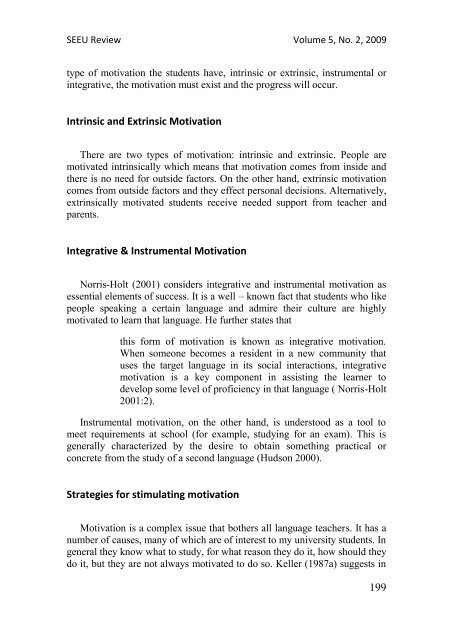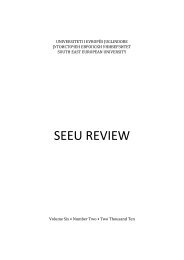- Page 1 and 2:
UNIVERSITETI I EVROPËS JUGLINDORE
- Page 3:
Contents Foreword by the Editor in
- Page 6:
UEJL për këshillat e tij në koh
- Page 9 and 10:
SEEU Review Volume 5, No. 2, 2009 J
- Page 11 and 12:
SEEU Review Volume 5, No. 2, 2009 J
- Page 13 and 14:
SEEU Review Volume 5, No. 2, 2009 f
- Page 15 and 16:
SEEU Review Volume 5, No. 2, 2009 J
- Page 17 and 18:
SEEU Review Volume 5, No. 2, 2009 c
- Page 19 and 20:
SEEU Review Volume 5, No. 2, 2009 j
- Page 21 and 22:
SEEU Review Volume 5, No. 2, 2009 T
- Page 23 and 24:
SEEU Review Volume 5, No. 2, 2009 a
- Page 25 and 26:
SEEU Review Volume 5, No. 2, 2009 1
- Page 27 and 28:
SEEU Review Volume 5, No. 2, 2009 c
- Page 29 and 30:
SEEU Review Volume 5, No. 2, 2009 t
- Page 31 and 32:
SEEU Review Volume 5, No. 2, 2009 e
- Page 33 and 34:
SEEU Review Volume 5, No. 2, 2009 R
- Page 35 and 36:
SEEU Review Volume 5, No. 2, 2009 T
- Page 37 and 38:
SEEU Review Volume 5, No. 2, 2009 n
- Page 39 and 40:
SEEU Review Volume 5, No. 2, 2009 a
- Page 41 and 42:
SEEU Review Volume 5, No. 2, 2009 A
- Page 43 and 44:
SEEU Review Volume 5, No. 2, 2009 w
- Page 45 and 46:
SEEU Review Volume 5, No. 2, 2009 T
- Page 47 and 48:
SEEU Review Volume 5, No. 2, 2009 i
- Page 49 and 50:
SEEU Review Volume 5, No. 2, 2009 M
- Page 51 and 52:
SEEU Review Volume 5, No. 2, 2009 G
- Page 53 and 54:
SEEU Review Volume 5, No. 2, 2009
- Page 55 and 56:
SEEU Review Volume 5, No. 2, 2009 L
- Page 57 and 58:
SEEU Review Volume 5, No. 2, 2009 m
- Page 59 and 60:
SEEU Review Volume 5, No. 2, 2009 L
- Page 61 and 62:
SEEU Review Volume 5, No. 2, 2009 t
- Page 63 and 64:
SEEU Review Volume 5, No. 2, 2009 o
- Page 65 and 66:
SEEU Review Volume 5, No. 2, 2009 g
- Page 67 and 68:
SEEU Review Volume 5, No. 2, 2009 1
- Page 69 and 70:
SEEU Review Volume 5, No. 2, 2009 A
- Page 71 and 72:
SEEU Review Volume 5, No. 2, 2009
- Page 73 and 74:
SEEU Review Volume 5, No. 2, 2009 a
- Page 75 and 76:
SEEU Review Volume 5, No. 2, 2009 L
- Page 77 and 78:
SEEU Review Volume 5, No. 2, 2009 H
- Page 79 and 80:
SEEU Review Volume 5, No. 2, 2009 T
- Page 81 and 82:
SEEU Review Volume 5, No. 2, 2009 T
- Page 83 and 84:
SEEU Review Volume 5, No. 2, 2009 S
- Page 85 and 86:
SEEU Review Volume 5, No. 2, 2009 T
- Page 87 and 88:
SEEU Review Volume 5, No. 2, 2009 h
- Page 89 and 90:
SEEU Review Volume 5, No. 2, 2009 1
- Page 91 and 92:
SEEU Review Volume 5, No. 2, 2009 H
- Page 93 and 94:
SEEU Review Volume 5, No. 2, 2009 s
- Page 95 and 96:
SEEU Review Volume 5, No. 2, 2009
- Page 97 and 98:
SEEU Review Volume 5, No. 2, 2009 m
- Page 99 and 100:
SEEU Review Volume 5, No. 2, 2009 T
- Page 101 and 102:
SEEU Review Volume 5, No. 2, 2009 P
- Page 103 and 104:
SEEU Review Volume 5, No. 2, 2009 I
- Page 105 and 106:
SEEU Review Volume 5, No. 2, 2009 e
- Page 107 and 108:
SEEU Review Volume 5, No. 2, 2009 1
- Page 109 and 110:
SEEU Review Volume 5, No. 2, 2009 C
- Page 111 and 112:
SEEU Review Volume 5, No. 2, 2009
- Page 113 and 114:
SEEU Review Volume 5, No. 2, 2009 D
- Page 115 and 116:
SEEU Review Volume 5, No. 2, 2009 g
- Page 117 and 118:
SEEU Review Volume 5, No. 2, 2009 T
- Page 119 and 120:
SEEU Review Volume 5, No. 2, 2009 a
- Page 121 and 122:
SEEU Review Volume 5, No. 2, 2009 d
- Page 123 and 124:
SEEU Review Volume 5, No. 2, 2009 R
- Page 125 and 126:
SEEU Review Volume 5, No. 2, 2009 S
- Page 127 and 128:
SEEU Review Volume 5, No. 2, 2009
- Page 129 and 130:
SEEU Review Volume 5, No. 2, 2009 W
- Page 131 and 132:
SEEU Review Volume 5, No. 2, 2009 M
- Page 133 and 134:
SEEU Review Volume 5, No. 2, 2009 I
- Page 135 and 136:
SEEU Review Volume 5, No. 2, 2009 9
- Page 138 and 139:
138 Reviewers: Benjamin Keatinge Dr
- Page 140 and 141:
Iranda Bajrami, MA kanë qenë të
- Page 142 and 143:
Iranda Bajrami, MA a state of c
- Page 144 and 145:
Iranda Bajrami, MA to read and use
- Page 146 and 147:
Iranda Bajrami, MA Classrooms were
- Page 148 and 149: Iranda Bajrami, MA the characterist
- Page 150 and 151: Iranda Bajrami, MA Not all the t
- Page 152 and 153: Iranda Bajrami, MA reinforce studen
- Page 154 and 155: Iranda Bajrami, MA References 1. Am
- Page 156 and 157: Iranda Bajrami, MA Appendix A Facto
- Page 158 and 159: Iranda Bajrami, MA Appendix B Obser
- Page 160 and 161: Iranda Bajrami, MA 22. Classroom en
- Page 162 and 163: Iranda Bajrami, MA Appendix C Stude
- Page 164 and 165: Iranda Bajrami, MA 9. 10. 11. 12. 1
- Page 166 and 167: Iranda Bajrami, MA Appendix D Teach
- Page 168 and 169: Iranda Bajrami, MA 18. 19. 20. 21.
- Page 170 and 171: Iranda Bajrami, MA Consistent with
- Page 172 and 173: 172 Reviewers: Prof. Dr. Kadri Sule
- Page 174 and 175: Mentor Hamiti, Visar Shehu and Agni
- Page 176 and 177: Mentor Hamiti, Visar Shehu and Agni
- Page 178 and 179: Mentor Hamiti, Visar Shehu and Agni
- Page 180 and 181: Mentor Hamiti, Visar Shehu and Agni
- Page 182 and 183: Mentor Hamiti, Visar Shehu and Agni
- Page 184 and 185: Mentor Hamiti, Visar Shehu and Agni
- Page 186 and 187: Mentor Hamiti, Visar Shehu and Agni
- Page 188 and 189: Mentor Hamiti, Visar Shehu and Agni
- Page 190 and 191: Mentor Hamiti, Visar Shehu and Agni
- Page 192 and 193: Mentor Hamiti, Visar Shehu and Agni
- Page 194 and 195: 194 Reviewers: Prof. Dr. Robert Sch
- Page 196 and 197: Assoc. Prof. Dr. Gezim Xhaferi and
- Page 200 and 201: Assoc. Prof. Dr. Gezim Xhaferi and
- Page 202 and 203: Assoc. Prof. Dr. Gezim Xhaferi and
- Page 204 and 205: Assoc. Prof. Dr. Gezim Xhaferi and
- Page 206 and 207: Assoc. Prof. Dr. Gezim Xhaferi and
- Page 208 and 209: Assoc. Prof. Dr. Gezim Xhaferi and
- Page 210 and 211: Assoc. Prof. Dr. Gezim Xhaferi and
- Page 212 and 213: 212 Reviewers: Prof. Dr. Selim Jusu
- Page 214 and 215: Fatmir Faiku, Haxhere Faiku, Murtez
- Page 216 and 217: Fatmir Faiku, Haxhere Faiku, Murtez
- Page 218 and 219: Fatmir Faiku, Haxhere Faiku, Murtez
- Page 220 and 221: Fatmir Faiku, Haxhere Faiku, Murtez

















